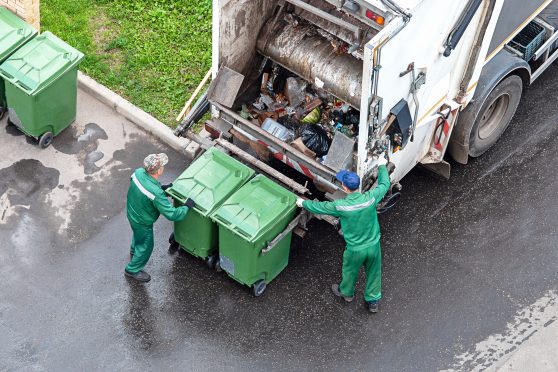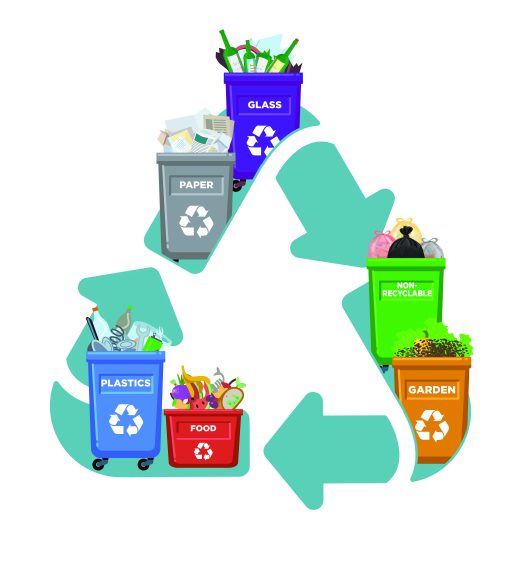
New laws punishing Scots who mix up their recycling are set to be policed by an army of specially trained bin collectors.
Local authority binmen will not only uplift containers full of rubbish and recycling – they will also report households who put items in the wrong bins.
Legislation passing through Holyrood will give extra powers to councils to fine residents who break the rules, for example by putting empty bottles or hedge trimmings into a general waste bin.
The laws are part of the Scottish Government’s plan to improve the country’s environmental performance.
Ministers are anxious to tackle the problem of “contaminated” waste, where tonnes of potentially recyclable material is too inter-mixed with non-recyclable items to be effectively sorted so ends up in landfill.
With the laws soon to be finalised by MSPs, The Sunday Post can reveal that new guidance is also being drawn up outlining the “reasonable enforcement” local authorities should use against people whose bins are filled incorrectly.
It is understood that a step-by-step process will see householders issued with warning letters, then fines and the threat of prosecution.
In readiness, Scotland’s largest local authority is training its refuse collection staff “to detect and record” households who mix up their bins.
Why is recycling so confusing?

Scottish households face a confusing array of different recycling systems from county to county – with some having to sort rubbish in up to six different bins.
South Ayrshire is one of the authorities which requires domestic properties to have up to six bins.
These are:
1. Blue bin for metal, plastics and cartons.
2. Grey bin for paper, card and cardboard.
3. Purple for glass.
4. Green for non-recyclable waste.
5. Brown for garden waste.
6. Food waste caddy.
Residents – particularly in built-up areas where homes have less outdoor space – have complained about the impact that having so many bins has on the appearance and tidyness of streets.
Circular Economy Bill
The bins crackdown is part of the Circular Economy Bill, which was published last year and which is about to be scrutinised at Holyrood before being introduced as law.
Measures include charges for single-use items, such as the “latte levy” on disposable coffee cups, and new fines for anyone caught throwing litter from a vehicle.
Another key measure makes it a criminal offence for households to mix up their bins and recycling – punishable with a fixed-penalty notice.
Research has shown the scale of the problem. Just under a fifth of everything put out for recycling by households is actually non-recyclable – which makes recycling collection more costly and sometimes whole loads have to be incinerated or dumped in landfill.
Members of Holyrood’s Net Zero committee said they recognised the “significant environmental and economic impact of contaminated waste and the need to design interventions to encourage householders to improve recycling behaviours” but raised concerns about how fines would be issued.
In response, Green minister Lorna Slater said a step-by-step list of “reasonable enforcement” measures was being drawn up.
She said: “Guidance on the approach to enforcement will be created in consultation with local authorities to indicate reasonable enforcement steps local authorities must take, and scenarios for when written warnings, penalty charges and/or fixed-penalty notices may be issued.”
Although she did not provide specific details, she suggested the guidance would be similar to that used by English councils to tackle littering – with a number of steps taken before a penalty can be issued, including a written warning and a final notice.
Slater claimed, however, the main purpose of fines was to help families “make positive changes”.
She said: “Local authorities should only use these powers after other options to engage with householders have been attempted. The primary focus is to make the right choices easier for householders and to support and enable householders to make positive changes to behaviours.”
Figures from the Scottish Environment Protection Agency (Sepa) revealed more than 2.3 million tonnes of household waste was generated in Scotland in 2022 – with an overall recycling rate of just 43.3%. The rate was less than 30% in Glasgow, Shetland and Orkney, but above 56% in Moray, East Renfrewshire and the Borders.
Section 46 of the Environmental Protection Act 1990 requires occupiers of a property to put household waste into allocated containers and ensure material is placed in the right bin for recycling, non-recycling or garden waste.
The new Bill states that “an authorised officer of a waste collection authority” can issue a fixed penalty if they believe someone has breached Section 46.
A fixed penalty is backed by criminal law but paying the fine means there is no conviction. However, failure to pay can lead to prosecution and a criminal record.
Binmen in many council areas are already ordered not to uplift bins or recycling containers that are contaminated. Instead they slap a sticker on the bin, requesting the householder fix the problem and present the bin again at the next collection.
Councils waiting to decide
Last week, councils around the country said they would await the introduction of the new laws before deciding how to implement them.
Glasgow City Council, however, confirmed that it was now introducing “a contamination policy which will supply frontline staff with the training and tools to detect and record contamination of recycling bins”.
The policy states: “Contamination in recycling bins is a significant issue that has both financial and environmental implications for the council. As well as meaning valuable resources cannot be processed into new items, sending waste to residual waste treatment and landfill is more costly than recycling it.”
A spokesperson warned extra funding would be needed, saying: “We welcome any additional enforcement responsibilities for local authorities, however, it would require the support of additional funding to ensure effective delivery.”
Last night the Scottish Tories warned the new laws could penalise people unfairly – for example, if passers-by drop the wrong item into a household’s bin.
Shadow Cabinet Secretary for Net Zero Douglas Lumsden said: “There’s widespread support for increasing recycling and reducing contamination, but it’s typical of the SNP-Green Government’s sloppy approach that it is introducing draconian penalties without thinking through potential snags.
“Councils have been so badly underfunded they can’t manage standard collections, let alone police infringements.
“Worse, fixed-penalty fines will end up being unfairly issued if the government doesn’t clarify what will happen with roadside collections – when anyone could add items to a householder’s bin – or communal bins outside flats.”
Yesterday the Scottish Government stressed fines were intended as a last resort.
A spokesperson said: “We want to create a circular economy, in which resources are kept in use for as long as possible. The Circular Economy Bill will establish the legislative framework to support that.
“Enforcement powers would be for persistent and deliberate lack of compliance, and a last resort for local authorities when communication, support and corrective action is not acted on.”

Enjoy the convenience of having The Sunday Post delivered as a digital ePaper straight to your smartphone, tablet or computer.
Subscribe for only £5.49 a month and enjoy all the benefits of the printed paper as a digital replica.
Subscribe © PA
© PA